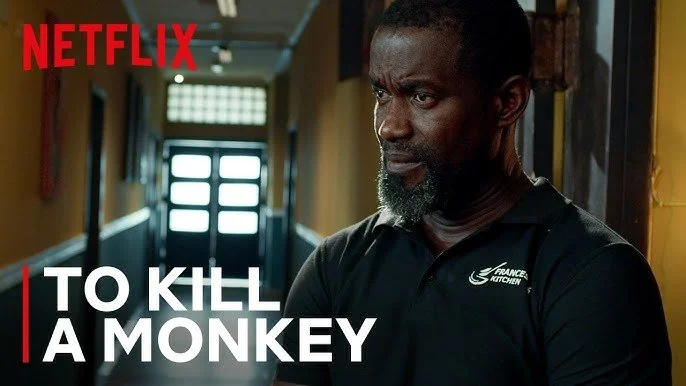Review: To Kill a Monkey - Netflix
To Kill a Monkey is a new Nigerian series on Netflix and it is not to be missed if you’re ready for a gripping cybercrime thriller and a gorgeous emotional mirror into deep universal reckonings. Huge salute to director Kemi Adetiba for her extraordinary vision that is bold, brilliant, and unflinching. The cinematography is also intoxicating and the soundtrack is beautiful and visceral.
To Kill A Monkey gravitates around the story of Efe, a father and husband who only wants to find his way out of humiliation and poverty: to fulfill his promises to his wife, to prove his dignity to his mother-in-law, to create a safe future for his kids. It’s impossible not to relate with him as a human longing for due respect in society. He tries to make a living by honest means but it doesn’t work, and even the humble gigs that leave him broke while bankrupting his self-esteem have their trappings. He prays to find a way out and the otherwordly Oboz appears. Efe gets to apply his intelligence and his talents with Oboz, and he transforms his financial reality, but even this new wealth proves to be a no-exit situation. Efe thinks he will be able to leave the criminal underworld once he has made enough money to do so, and yet “enough” becomes, proverbially, never enough. His prayer becomes a curse.
The story shines most of all because of the acting. The whole cast is phenomenal and radiant. William Benson as Efe transmits such a raw ache and intensity that pulls straight at your heart. If you’ve been numbed by the state of the world today, his acting will help you feel again. Bucci Franklin as Oboz brings an electric jolt to the screen with equal parts exuberant danger and brotherly devotion. Bimbo Akintola as Inspector Mo stunningly conveys the complex emotional experience of a woman living with post-traumatic stress, caught between lucid dreams and gaslit reality, with amazing precision and queenly presence.
Two reasons I feel compelled to write about To Kill A Monkey after just watching it:
The character struggles are so palpable and personal. I’m not a husband nor a father, nor a man ready to submit to a world of crime like Efe; I’m not a wife nor a mother, nor a woman ready to combat crime like Inspector Mo. But I’m also like both of these characters as a yoga teacher who has struggled for too long with the economic precarity of gig life, and I’m a recovering filmmaker wrestling with unfulfilled promises and post-traumatic stress. Like the main characters in To Kill A Monkey, I have held humbling positions that challenge self-identity. I have experienced social invisibility as well as the liminal weaving of dreams and reality.
I am also, relatedly, in the midst of writing a memoir about my time working on the Hollywood movie The Interpreter, a political thriller directed by Sydney Pollack (Academy Award–winning director of Out of Africa). That film depicted a decolonizing African country through the white male lens of the Hollywood imagination. It made history as the first (and, to my knowledge, the only) Hollywood film shot inside the United Nations headquarters in New York. It was also filmed in my own NYC apartment, which served as Nicole Kidman’s character’s home in the story, and on set in Maputo, Mozambique. There is much to say about The Interpreter, both favorable and unfavorable, and how it changed my life, which is why I am writing a whole memoir about it. For now, I just want to highlight a line Nicole Kidman delivers in that film that continues to resonate:
“Vengeance is a lazy form of grief.” - Sylvia, The Interpreter
This line, although unstated, also resounds throughout To Kill A Monkey.
When loved ones die at the hands of others, and instead of grieving, vengeance is sought, then the blood thirsty cycle of violence and sorrow only becomes more thirsty. Grieving, internal connection, could quench that thirst and cut that cycle, but we too often choose to project our feelings on others and seek resolution externally.
Will violence and betrayal ever end if we are not the ones to change the cycle?
Another striking parallel between The Interpreter and To Kill A Monkey is the character of the Teacher. In The Interpreter, the fake African dictator Edmond Zuwanie was once called the Teacher by his people, a name that reveals how power meant to liberate through knowledge can easily become corrupt and imprison through control.
In To Kill A Monkey, the character of the Teacher is an elder in the cybercriminal community who demands tax from Oboz and Efe for their rising success on his turf. When the young tycoons refuse and retaliate against the Teacher’s threats, the Teacher escalates to demanding their blood, literally, and cursing their families and all their connections.
That plot twist struck something tender in me about the double-edged role of teachers, mentorship, and elders in our lives.
When the experienced figure, the elder, perhaps even the ancestor, who can guide us towards our own realizations and growth, entangles us instead in their own cycles of power, fear, and indebted obedience, what are they really teaching, what are they transmitting, what are they passing on?
Perhaps these kinds of “teachers” remind us to question where guidance ends and control begins. How fragile can freedom be. How love and loyalty can be weaponized against ourselves.
And maybe, in their own shadowed way, these “teachers” are teaching that our real work as students is to discern the difference, to understand when a teaching points to liberation or becomes a form of predation.
When power is disguised as pedagogy.
Most of all, To Kill A Monkey reminds me of a deep and universal truth, embodied by Efe and Oboz:
There is no such thing as an individual rise or fall.
In the best of ways and the worst of ways, our successes and failures are ultimately collective processes. We are bound together in webs of influence and consequence: karma.
To Kill A Monkey doesn’t just entertain, it provokes reflection and introspection. It shows us how cycles of violence, ambition, and power are not distant stories, but the very questions of our time. How do we break the patterns that keep us trapped? How do we grieve without vengeance? How do we strive and thrive with dignity?
These are not only Nigerian questions, they are human ones, urgent for us all today.
Bravo to Kemi and her extraordinary team for giving us a story so strongly felt and stirring.
I feel called to correct my English now, Lagos style!
With admiration,
San-San (Sandi)



